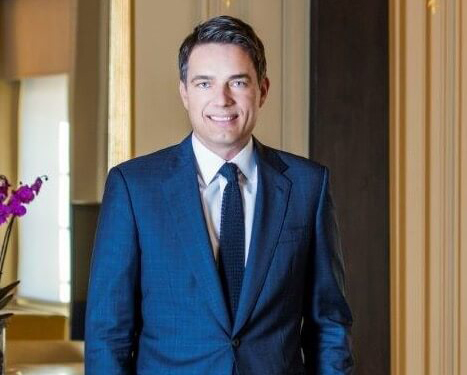He has been the youngest ever GM at Claridges, led the reopening of the prestigious Connaught Hotel in Mayfair, and even fronted a prime-time BBC documentary. What he doesn’t know about hotels and service probably isn’t worth knowing.
We caught up with Thomas Kochs, now MD of Hotel Cafe Royal in Soho, to gauge his thoughts on all things service.
You have had quite a career already, how do you feel about the path you have chosen?
I’ve been very fortunate to have had some amazing and remarkable experiences in my career. I knew from a very young age that I was destined to have a career in hospitality and haven’t looked back ever since. It is really a wonderful sector to work in and has given me and many of my peers, a fantastic quality of life.
Like with any career, you have to work hard, but it opens many doors to you and is extremely rewarding.
How did you initially choose to pursue a career in hospitality?
I actually checked myself out of med school when I was studying to be a doctor. I always knew deep down that I wanted to be a hotelier but it took the first semester at medical school for me to realise that.
As with medicine, if you want to succeed in hospitality, you have to been very committed and focussed. I knew that my heart was in hospitality so I left medicine to give my complete focus to this career.
I actually remember being a waiter at 15 years old and always feeling incredibly happy to be at work. I really buy into the idea that ‘if you love what you do, it will never feel like work’. This has always been the case for me.
You were the youngest person to become GM at Claridges, how did that feel?
It was obviously a very proud moment for me but I didn’t really consider my age and its relevance. I felt I was ready to take on the role based on the experience I had and it was a challenge I was ready to take on.
How did you know you were ready?
To be honest, I always think you should make a move just before you are actually ready to do it. I don’t think one ought to be reckless and go for a role that they are not experienced to do but I do believe that you ought to take roles that will stretch you and your experience.
So what advice would you give budding young service staff, looking to work their way up through the ranks?
It really depends on what part of the industry they want to work in. I urge people to spend some time to understand where they want to be.
I suggest they take a moment to imagine that they are 45, 50 or 60 years old, looking back at their lives and careers. What do they need to do to make sure that they don’t have any regrets?
Being analytical is very important. There are opportunities for all types of people, but you need to be honest with yourself.
Some people like the commercial side of the industry. Obviously running a hotel is a pretty demanding job and requires a different set of skills. A hotelier is a business manager so there are specific skills they require.
Early on in my career, I asked myself these big questions. I knew that, in order to run a big hotel in a major capital city, I needed to develop my commercial acumen, that’s why I ended up doing an MBA. To be an MD of a hotel of this size, I felt I needed to study.
It is not a must, but for me, I needed to broaden my horizons in that way. Whilst our industry offers great careers for people with all levels of education, if they want to go down the path I have, I’d recommend this route.
It’s important to plan. I always say – young people have time, but no time waste.
What about personality, how important is this and what makes a good restaurant manager, for example?
I think restaurant managers need to be in tune with life. We deliver experiences; what can mean the world to one person may not mean the same to another.
People need to have the ability to deliver a personalised service and have the emotional intelligence and intuition to understand what their guest needs, and at what time. To create a perfect or captivating moment can mean a thousand different things to a thousand different people.
How do you feel about the perception of the industry?
To be honest, I really want to see more people coming into hospitality as a career choice, not because they didn’t have another path they wanted to pursue. The industry isn’t a placeholder for those who don’t know what they want to do. It is up to the industry to make sure that we make it more attractive and things like the Gold Service Scholarship really helps.
We also need to provide a work environment that offers people a real choice; whether it’s through development, succession planning, pay etc, we need all need to make hospitality a place people are desperate to work in.
I think our entry-level roles need to be more attractive. In the long term, one can earn as just as much as most industries buts it’s the very first stage that we can all do more to make it attractive to the talent pool.
Its worth noting that the whole industry has this image of being unsociable in terms of the hours people work. It’s just not true. It is probably the most flexible profession and people can work around their lives as they wish. As long as they are prepared to work hard and create memorable connections with guests, they can create roles and careers in a way that suits them.
The industry moves fast, do you think standards have changed over the years?
Of course, everything moves and changes, particularly in our industry.
If you look at style of service now, we are seeing a lot more informality encouraged. I think many of us in the industry will also say that providing informal service is not as easy as it sounds.
Nobody wants contrived and stiff and we all like effortless and informal, but what happens when the informal feels contrived? This is arguably even more complicated than formal. It is a fine line between being informal and not intrusive. This is where you rely more on intuition. That’s why recruitment of talented people is really important.
You’ve worked in many different places, what is service industry like in UK compared to other countries?
In most instances, service is intangible so we cannot compare directly to other countries. What I can confidently say is that each country has its own personality and tone which isn’t comparable to another.
You will receive a very different type of service in New York compared to the Caribbean for example.
In the UK, we have a very competitive hospitality industry which ensures that standards are always being tested and challenged.
That’s why Gold Service Scholarship is so fantastic as a competition. It really brings together the best of British talent.
Now in its fifth year, how do you think the Gold Service Scholarship has helped the industry?
I think it has really brought service to the forefront of people’s minds. It really demonstrates the importance of a profession when The Queen attends the final ceremony to present the winner with their prize. Its really something special.
Also, given the fact that so many of the industry’s greats are involved in the Scholarship, it really encourages future stars to develop and strive to improve.
What are your thoughts ahead of this year’s final?
Standards are incredibly high and I’m sure we will see another fantastic final. We’ve seen another huge intake of people from a very diverse range of businesses. They have really impressed our judges and we are all incredibly encouraged by the people coming through.
Given how tight the semi-finals were, I expect it’s going to be a very close final too. We are all incredibly excited.



